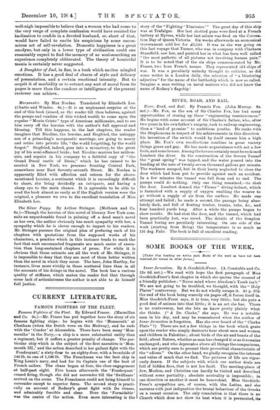The Silver Poppy. By Arthur Stringer. (Methuen and Co. 6s.)—Though
the heroine of this novel of literary New York com- mits an unpardonable fraud in palming off a dead man's novel as her own, the author obviously has much sympathy with her, a sympathy which he is clever enough to impart to his readers. Mr. Stringer pursues the original plan of prefacing each of his chapters with quotations from the supposed works of his characters, a practice which in this instance tends to mark the fact that such unconnected fragments are much easier of execu- tion than long-sustained chapters of prose. For while it is obvious that these extracts are all the work of Mr. Stringer, it is impossible to deny that they are most of them better written than the novel in which they occur. The hero, John Hartley, for instance, lives more vividly in these scattered lines than in all the accounts of his doings in the novel. The book has a curious quality of stiffness, which makes the reader feel that through some lack of articulateness the author is not able to do himself full justice.






























































 Previous page
Previous page